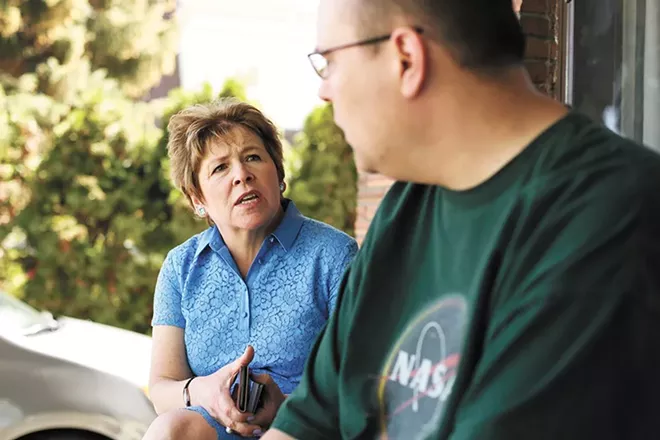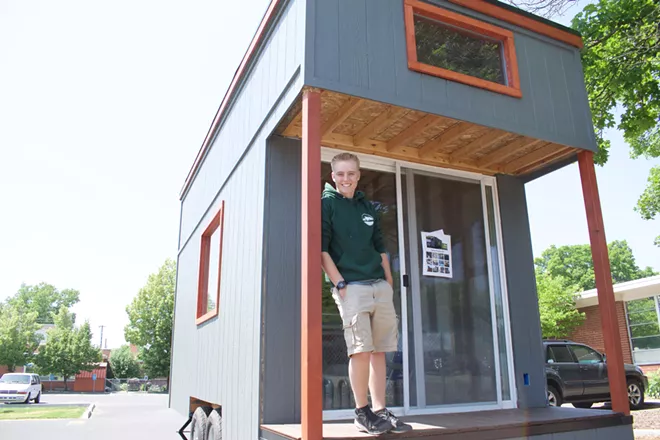Tuesday, June 12, 2018
Wilco frontman Jeff Tweedy is swinging through Spokane on Wednesday, Sept. 26, for a show at the Bing Crosby Theater.
Tickets for the show, $49 and $60, go on sale at 7 pm on Thursday, June 14, via the Bing's website and TicketsWest outlets.
Tweedy's solo tours have become celebrations of the singer/songwriter's sprawling career that includes nearly a quarter-century fronting Wilco, seven years and four albums with Uncle Tupelo before Wilco's formation and writing and producing for the likes of Mavis Staples, the Minus 5 and others.
His most recent solo album, Together At Last, is essentially a version of his solo shows — it's him in a studio reconfiguring songs from his past Wilco, Golden Smog and Loose Fur releases. Expect to hear those and many more at his show in Spokane this fall.
Here's a clip of Tweedy doing "Sunken Treasure" solo-style:
Tags: jeff tweedy , wilco , bing crosby theater , For Fun! , Music , Image
NEWS: Lori Isenberg, the woman facing charges in Kootenai County for embezzlement and who has skipped two court appearances after her husband's mysterious death, made about 75,000 per year as the director of a nonprofit.
FOR FUN: Quinn Welsch, a recent transplant to the Spokane area, went to the Spokane Pride Parade and had himself a good time.
NEWS: In a 4-4 U.S. Supreme Court decision, Washington state remains on the hook for replacing culverts in order to protect salmon habitat.
IN OTHER NEWS

Art of the deal
Possibly carrying the fate of two countries in the palms of their hands, President Trump and North Korean leader Kim Jong-un shared a long handshake before beginning the first summit between the U.S. and North Korea. In the end, Trump agreed to suspend joint military exercises with South Korea. In turn, he says that he is confident Kim would begin dismantling his nuclear arsenal "very quickly." (New York Times)
Keeping it neutral
Net neutrality protections were thrown out the window everywhere but Washington state yesterday. The state law ensures that telecom providers will treat all content equally, preventing them from slowing down certain internet sites. (The Stranger)
Surprise down under
Washington State University and University of Idaho researchers say there may be double the amount of magma underneath the Yellowstone volcano than previously thought. (Spokesman-Review)
Turned on its head
To the dismay of local businesses, Seattle City Council passed a head tax last month to pay for homeless services. Now, the City Council plans to reverse the decision. "We heard you," says Mayor Jenny Durkan. (Seattle Times)
Tags: trump , kim jong-un , north korea , nuclear weapons , net neutrality , News , Image
Monday, June 11, 2018
A few years back I was watching a Steve Earle concert when I had one of those realizations that comes along every now and again when you're witnessing something special:
"Don't ever miss Steve Earle in concert."
Those are true words to live by for any fans of the notoriously loudmouthed, country-tinged troubadour, and even for folks who aren't privy to his excellence (yet) — so prepare thee to get some tickets for his just-announced show this fall, where he'll be joined by his band the Dukes for a gig at the Bing Crosby Theater.
Tickets for Steve Earle & the Dukes, playing Oct. 1 at the Bing, are $39.50 and $50, and go on sale this Friday at 10 am through the usual TicketsWest outlets and the Knitting Factory website.
Earle, a three-time Grammy winner and 11-time nominee, has released 20 albums over the course of his career. His latest with the Dukes is So You Wanna Be An Outlaw, and it's another fine addition to a catalog that moves between country, folk, rock and blues with ease. I've seen Earle several times through the years, most recently on his tour through Spokane with Shawn Colvin; that show was killer, and he's never disappointed when I've seen him.
In addition to making music, Earle is an actor, novelist, playwright, radio host and activist who works tirelessly in opposition to the death penalty and in favor of removing vestiges of the racist American South. So leave your Confederate flags at home, please.
Here's the title track from Earle's latest album:
In a 4-4 decision, the U.S. Supreme Court let a lower court ruling stand in Washington v. United States, meaning Washington still has to replace culverts that help water pass under roads around the state in order to protect salmon habitat.
The case, nearly two decades in the making, was started when several Northwest tribes and the federal government sued the state in 2001, arguing that treaty rights protected not only tribes' right to fish, but a right to healthy habitat and numbers of fish.
The 9th Circuit Court of Appeals agreed, holding that the agreements established "that the number of fish would always be sufficient to provide a 'moderate living' to the tribes."
In its request that the Supreme Court take up the case, the state argued that the 9th Circuit wrong in ordering the state to replace or repair 817 culverts within the treaty area at a cost of billions of dollars, because that didn't take into account whether there'd actually be a benefit to fish by doing so.
The state also argued that the culvert designs in question were provided by the federal government, so the state shouldn't be the sole bearer of the cost of replacement, and that the decision could be used in the future to argue for removal of dams or change other practices at state cost, and could apply to other states where similar treaty language was used.
Washington State Attorney General Bob Ferguson issued the following statement:
"Today’s ruling brings a resolution to a case that has gone on for nearly 20 years, defended by multiple attorneys general. It is unfortunate that Washington state taxpayers will be shouldering all the responsibility for the federal government’s faulty culvert design. The Legislature has a big responsibility in front of it to ensure the state meets its obligation under the court’s ruling. It’s also time for others to step up in order to make this a positive, meaningful ruling for salmon. Salmon cannot reach many state culverts because they are blocked by culverts owned by others. For example, King County alone owns several thousand more culverts than are contained in the entire state highway system. The federal government owns even more than that in Washington state. These culverts will continue to block salmon from reaching the state’s culverts, regardless of the condition of the state’s culverts, unless those owners begin the work the state started in 1990 to replace barriers to fish.
I look forward to working with tribal governments to advocate for the funding necessary to comply with this court order, and to ensure other culvert owners do their part to remove barriers to salmon passage."
Northwest Indian Fisheries Commission Chair Lorraine Loomis lauded the decision, and issued the following statement:
"Today is a great day for salmon, tribes, treaty rights and everyone who lives in western Washington. This Supreme Court ruling means more salmon for everyone.
It will open hundreds of miles of high-quality salmon habitat that will produce hundreds of thousands more salmon annually for harvest by Indians and non-Indians.
The Supreme Court has affirmed a common-sense ruling that treaty rights require there to be fish available for harvest. It affirms that the state can’t needlessly block streams and destroy salmon runs.
The main cause of the salmon’s decline is that we are losing habitat faster than it can be restored. The ruling will result in a net gain of habitat that salmon badly need.
Today’s ruling shows that our treaties are living documents. They are just as valid today as the day they were signed.
We honor the wisdom of our ancestors who signed the treaties, and those like Billy Frank Jr., who fought so hard for the survival of the salmon and for our treaty-reserved rights to be upheld.
This is the eighth time that the state and its allies have gone all the way to the Supreme Court to avoid living up to the treaties’ promise, and the eighth time they have lost. It is time to get the lawyers out of the way and do what is right.
The salmon resource is priceless. Fixing culverts and doing the other work needed to save that resource will require significant investment, but will pay off for generations to come.
We are eager to continue our efforts with our co-managers and others to protect and restore the salmon resource for future generations."
Hilary Franz, commissioner of public lands, issued this statement:
"Today’s decision affirms that it is our collective responsibility to ensure the survival of Pacific salmon. This decision is fair under the letter of the law, but it is also just. Protecting salmon is an issue not just of importance to Washington’s tribes, but to all of us.
The time is now to think boldly about how we move forward on many fronts, including culverts.
My agency, the Department of Natural Resources, stands ready to work with tribes, state agencies, counties, private landowners and federal partners to restore and protect our treasured salmon.
It is time to stop fighting over who should do what. Instead, let us roll up our sleeves, stand shoulder to shoulder, and get to work saving our Pacific salmon for future generations. It’s time to do the right thing."
Tags: news , culverts , salmon , treaty rights , tribes , northwest , supreme court , washington v. united states , Image
The weather was trash, I was running late and, to be honest, I didn’t expect to see a soul at the Spokane Pride Parade on Saturday, June 9.
I couldn’t have been more wrong.
I'm a recent transplant to this area. Before I moved from the cozy confines of Western Washington, everyone warned me about what to expect. Well, once again, Spokane has proven the haters wrong.
Thousands of people took to the streets on Saturday afternoon, seemingly in spite of the crappy weather. Bright and bold fashion choices beamed under a gloomy sky — somewhat of a metaphor for the mood of the 26th annual parade.
Holding a sign at the parade that read “Isn’t Hate A Sin?” local artist Rose Shankman says this is just one of eight demonstrations she’s participated in since 2017.
“I have a lot of angst since 'you-know-who' got into the White House, and I have to do something as positive as I can,” she says.
The feeling was echoed by others at the parade, including National Teacher of the Year Mandy Manning, who was OutSpokane’s recipient of the inaugural Stonewall Impact Award.
“I think we can agree that we are in the middle of tough times. There are people with negative opinions and feelings who are feeling emboldened ... and that’s why it is right for us to stand up and fight for what is good,” she told the crowd gathered in Riverfront Park on Saturday.
Tags: spokane pride , outspokane , For Fun! , News , Image
Coeur d'Alene Police reports recently released to the Inlander give more details about the inner workings of the nonprofit North Idaho Housing Coalition (NIHC) where Lori Isenberg worked as the executive director.
Isenberg is currently facing charges in Kootenai County for embezzling about half a million dollars from the nonprofit that buys and rehabilitates homes and resells or rents them to low and moderate-income buyers. Since her arrest in February, she has skipped two court appearances, and there is now a $500,000 warrant for her arrest.
Police interviews with two people in particular, NIHC President Kerri Thoreson and Treasurer Kevin Vedder, illuminate Isenberg's history with the NIHC and the level of trust the organization's board put in her.
"You look back and why did we give her so much authority or power," Vedder tells police. "Such a lack of oversight."
Before Isenberg was fired from the nonprofit, Thoreson says Isenberg was "very well compensated," to the tune of $75,000. Isenberg also hired her daughter, April Barnes, as a part-time employee. Thoreson tells police that the board approved the part-time hire, but was unaware Isenberg had hired her daughter for the position. Vedder, however, does remember Isenberg disclosing their relationship.
Both Thoreson and Vedder say they've known Isenberg for a long time, and neither would have suspected that she would steal from the organization. In fact, up until she was made aware of Isenberg's crimes, Thoreson says she would have given Isenberg a "glowing review." Isenberg has admitted to police that she stole money from NIHC.
To police, and in a follow-up conversation with the Inlander, Thoreson emphasizes that Isenberg did not have the authority to sign checks (investigators found numerous checks with forged signatures) and was not the nonprofit's accountant.
Generally, Isenberg's responsibilities, Vedder tells police, were to secure grant funding, find houses for the organization to purchase and rehab, execute the purchase and sale agreement, obtain a check from NIHC's contracted accountant and verify the work when the house was completed.
The organization had no official policies laying out responsibilities, salary or authority for Isenberg's position, Vedder tells police. "They, the board, just allowed Lori to continue doing what she was doing since they were getting 'lots of good press' and the organization was fully immersed in making affordable housing," according to the police report.
It was within the 18 months preceding her termination, when the board agreed to bring the accounting and contracting functions in-house at Isenberg's suggestion, that the alleged crimes took place, including payments to "ghost companies" Isenberg had set up in her name and her daughter's name.
Isenberg has admitted to police that she stole money from NIHC, but gave it to her daughters for "medical expenses," though Thoreson notes that those statements have not been verified.
At the same time Coeur d'Alene Police were investigating her alleged financial crimes, Isenberg's husband, Larry, ended up in Lake Coeur d'Alene while the couple were on an early morning boat ride in February. His body was found March 1, and the investigation into his death is still ongoing, according to Kootenai County Sheriff's Office Detective Dennis Stinebaugh, who would not say whether Isenberg was under investigation for her husband's death.
Moving forward, Thoreson says, NIHC is close to hiring an interim director to help "right the ship" and provide recommendations for what authority and responsibility should be given to the permanent director, as well as how the board should oversee the position.
"I don't know that there's a bright side to this story," Thoreson says. "But we definitely are taking very seriously our responsibility to the organization."
NIHC is largely funded through federal grants. Thoreson says she is unsure whether this ordeal will put future grant applications in jeopardy, though she is hopeful the nonprofit can continue to receive those funds.
"Speaking for the board, we want her to have her day in court," Thoreson says. "It's an important part of the process, and it's incredibly frustrating that she has failed to show up. I'm hoping we will have the opportunity of having her appear in court sooner rather than later."
Tags: Lori Isenberg , Larry Isenberg , Coeur d'Alene , North Idaho Housing Coalition , missing , embezzlement , News , Image
FOR FUN!: For his senior project, this Spokane student built a tiny home that he hopes will save him from paying rent in college.
NEWS: So you've heard a bit about tariffs, Trump and possible trade wars, huh? Here's where Cathy McMorris Rodgers and Lisa Brown stand on recent tariffs and trade policy.
WHAT'S UP?: Music, baseball, pub crawl, movies and more, here's this week's curated list of things to do.
IN OTHER NEWS
North Monroe ahead of schedule
The construction on North Monroe, which includes work to narrow the number of lanes and improve pedestrian safety, has reached its halfway point well ahead of schedule. (Spokesman-Review)
Trump arguing with allies ahead of North Korea summit
As he's getting ready to meet with North Korea's leaders to discuss a nuclear deal this week, President Trump has been striking out with America's close allies in the Group of 7, including Canada, which has announced it will counter U.S. tariffs with its own. (New York Times)
Winner winner, Boise dinner
Someone won $2 million on a Powerball ticket bought in Ada County, Idaho, and because the winning ticket didn't match the actual Powerball but had the first five numbers right, lottery officials are reminding people to check their tickets closely. (Idaho Statesman)
Rainin' on the parade
It was a wet Saturday, but plenty of people still showed up for Spokane's Pride celebration, with a parade and party in the park. (KXLY)
Tags: news , morning headlines , north monroe , trump , north korea , g7 , powerball , lottery , pride , spokane , 5th district , congress , tariffs , trade , tiny house , Image
Sunday, June 10, 2018

After a pause for some vacay and Volume, I'm back with some tips on things to do to keep yourself entertained this week. It's summer, so I know you need that now more than ever. You can always find hot tips in our event listings and Staff Picks; here are some highlights of the week ahead:
Monday, June 11
FOOD | Take full advantage of your garden and the local farmers markets with this Salad Lab Culinary Class, offering advice the on the best way to balance that healthy dinner of yours. It happens at Kitchen Engine.
Tuesday, June 12
DRINK | You might think construction season isn't the best time to do a Monroe Street Pub Crawl, but you'd be wrong. The bars need your business, and it's easier than you think to get to all of them. This one starts at The Hub at 5 pm, and will hit five spots by 8 pm.
MUSIC | Sergio Mendes brings his soulful Brazilian jazz and samba sounds to The Fox tonight. That's a fine way to celebrate the start of a steamy summer. I mean, look at this bit of coolness from his old days:
Wednesday, June 13
FILM | Opening night of this year's Riverfront Park outdoor-movies series is worthy superhero flick Wonder Woman.
Tags: MAC , Observatory , spokane indians , fox theater , riverfront park , What's Up? , Video , Image
Friday, June 8, 2018

Tariffs, make no mistake,
And it can get worse: A country you export your goods to may level a retaliatory tariff, making it more expensive for people in those countries to buy those goods. And then there's retaliation to that, and retaliation to that, yadda, yadda, yadda, and then you've got a trade war going.
And that's bad. And it's really bad for Washington.
"I come from Washington state," McMorris Rodgers said in March on Bloomberg TV. "It's the most-trade dependent state in the country. Forty percent of the jobs of Washington state are dependent on trade."
Similarly, here's Washington Sen. Patty Murray: “While we can and should recognize there is a problem with the overcapacity and oversupply of steel and aluminum, Trump’s trade wars will hurt growers, our state’s economy and families across the country who could see the costs of everyday goods go up.”
But statements are one thing.
Or do you try to pass legislation to constrain the president's authority? That's exactly what Sen. Bob Corker, a Republican from Tennessee, is doing.
Trump has been claiming "national security" as the reason he's leveling tariffs on the European Union, Mexico
So would Rep. Cathy McMorris Rodgers support that bill?
Perhaps, says McMorris Rodgers press secretary Jared Powell. But because bills can change, she's not making a commitment.
"She supports most of the provisions in that bill," Powell says. He says that McMorris Rodgers, who has spoken about a desire to return more power to the hands of the Legislature, wants Congress to have more of a say in trade negotiations.
"She wants to reverse course on these tariffs," Powell says. "That’s going to take legislative action or it will take convincing the administration to walk back on it. If they were to change their mind it would be the easiest solution."
But McMorris Rodgers' opponent, Lisa Brown, is skeptical that the congresswoman actually ever would vote for a bill that Trump wouldn't sign. She points to a statement from Speaker of the House Paul Ryan on Corker's bill.
“You’d have to pass a [bill] that he would want to sign into law and that would be what it would take,” Ryan said.
Under Obama, both Ryan and McMorris Rodgers were more than happy to push forward bills — like the repealing Obamacare — that
So I posed that question to Powell: Would McMorris Rodgers be willing to vote for trade legislation that the president would try to veto?
He wasn't quite sure.
"That's hard to say. She wants the tariffs to stop," Powell says. "She’s open to all options... Her goal is to protect farmers and stop these tariffs."
Powell promised to get a clear answer next week. We'll update the blog then.
Brown, like McMorris
"I do believe that it would be appropriate for the Legislature to reassert more of its role in international trade," says Brown. "I think that’s especially true under this administration."
Meanwhile, neither of Washington's senators had signed on to Corker's bill yet, but they haven't been opposed either.
Patty Murray, who has weathered political backlash for having been among the more free-trade supporting Democrats, said she was open to a similar bill.
"Sen. Murray shares Sen. Corker's concerns about Trump's reckless action in recent days, and how it will affect families and businesses in Washington state and across the country," says spokeswoman Kerry Arndt. "While she isn't currently a co-sponsor of his particular piece of legislation, she is in discussion with Sen. Corker and a number of other members who are exploring the different options to rein in abuses of Section 232."
Sen. Maria Cantwell's team, meanwhile, said that she's looking at the legislation, but declined to say much more than that.
"Sen. Cantwell has concerns about the Trump administration's current approach to trade and tariffs," Cantwell spokesman Bryan Watt says. "With the legislation just being introduced, she is talking with stakeholders and evaluating the legislation."
In an interview last month, McMorris Rodgers named trade when asked which topics she most passionately disagreed with her party on.
"I do not support the across-the-board tariffs the president has floated as far as aluminum and steel are concerned," McMorris Rodgers says.
Instead, she says, any tariffs should be focused on countries that are involved in unfair trade practices involving things like intellectual property violations and exporting goods at artificially deflated prices.
"Make sure that we're focused on the bad actors and not jeopardizing the important trade relationships we've developed with allies," McMorris Rodgers says.
She notes that she's spoken out in opposition, but she also says she's lobbied key officials behind the scene as well.
"Most recently, I sat down with Larry Kudlow, who the new economic advisor, and talked to him personally," McMorris Rodgers says. "He assured me that no decisions have been made and everything is on the table. We are continually having these discussions with the administration."
McMorris Rodgers says she's talked with Trump too.
"I've talked to the president personally about the importance of these trade agreements," she says. "And what he told me was
But Brown is dismissive of the idea that McMorris Rodgers' lobbying efforts have borne any fruit.
"I guess I have to say thus far if she’s working behind the scenes, we’re not seeing the positive results," Brown says.
Lisa Brown got her degree in economics. She used to teach it.
"We do talk about that in Econ 101," Brown says. "Although tariffs can be a tool in trade negotiations, they often simply spark retaliatory tariffs. And then everybody is worse off. Then it can cause a real economic downtown."
In particular, Brown is concerned
Businesses across the world rely on predictability, the argument goes, and uncertainty can be paralyzing.
Similarly, she's critical that Trump pulled out of the Trans-Pacific Partnership trade without anything replace it.
If Brown wins, of course, she'd be facing at least two years of Donald Trump. Even if Democrats win the House and the Senate, he'd still be able to veto most bills. But Brown still believes she'd more effective than McMorris Rodgers in that environment.
"I do have experience in working across the aisle on complicated multifaceted issues," Brown says. She also points to her economics experience and says she'd be eager to serve on the House Committee on Agriculture.
She says that local farmers are particularly worried about the impact of Trump's trade policies, which threatens to sweep off the table years of hard work.
"Those Asian markets took decades to develop," Brown says. "We are at a disadvantage now."
The Inlander also asked Idaho U.S. House candidate Russ Fulcher about how he felt about Trump's approach to trade policy. Are "trade wars good and easy to win?"
No, Fulcher said.
“Generally speaking I’m not a big tariff guy,” Fulcher says. “Because it runs into that trade war.”
Yet, he
“There was no possible way that an American company could compete fairly when governments are subsidizing competitors,” Fulcher says. “If our producers are subjected to a playing field that is not fair, then that’s something we need to take a look at. But that’s the exception, it’s not the rule."
Tags: Trade , Cathy McMorris Rodgers , Lisa Brown , Russ Fulcher , Maria Cantwell , Patty Murray , News , Image
Four years ago, Emmett Linklater could have chosen anything for his final project at the Community School. He decided to do something big.
Well, "big" in a tiny sort of way.
Linklater will graduate this month with a tiny home he built for his required independent school project. But Linklater didn't just do it for school credit. He plans on living in it for college at Western Washington University.
"I just like the idea of having a house that I can move to where I want to go," Linklater says.
During Linklater's first two years at the Community School, a project-based high school, he mostly planned out what he wanted the tiny house to look like. It's about 210 square feet — an average size for a tiny home. The interior isn't finished yet, but
Linklater knew a little bit about woodworking. He had to learn how to weld for the trailer the home sits on, he says. The last couple months, he built the frame and did the exterior work with the help of some family friends. He designed it knowing that one day he would eventually live in it.
"I like living simply and living smaller," Linklater says.
Theoretically, it will save Linklater money. Linklater says his parents helped him with the costs of building the home. They did so
"I'm lucky enough to have parents who funded it, they kind of think of it as saving money," Linklater says. "They can pay a couple thousand dollars to build a tiny house, or pay tens of thousands of dollars to room me at college for a couple years."
Linklater plans on majoring in environmental science at Western Washington University. He won't live in the tiny house immediately, because he wants some time to figure out where he's going to put it.
Linklater admits that the project took more work than it needed to for the school's requirements of the independent project. The school lets the students choose almost anything they want to for the project. They can build something, learn a skill, write a story, or do anything else they're interested in. The students just need to have a plan and follow through with it by the time they graduate.
"The idea," Linklater says, "is you get something out of it more than a grade."
And now, the high school senior has a home.
Tags: tiny home , the community school , spokane public schools , emmett linklater , western washington university , graduation , News , For Fun! , Image














